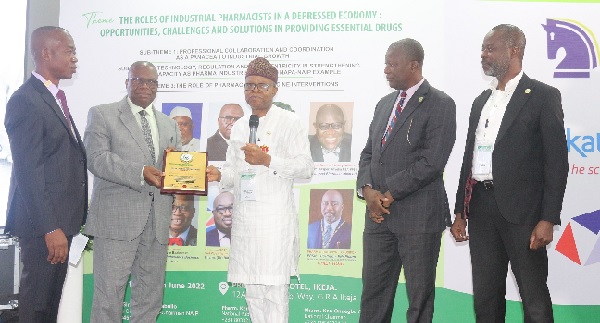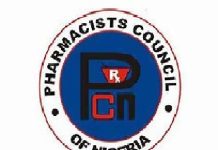– Say harassment of pharmacists, duplication of efforts needless

Stakeholders have lamented what they describe as over-regulation of the Nigerian pharmaceutical industry, saying the regulatory system and agencies have been unfair to the industry, despite its indispensability to the wellbeing of the citizens.
The concerned pharmacists who the spoke at the plenary session of the recent annual national conference of the Association of Industrial Pharmacists of Nigeria (NAIP), held in Lagos, lamented that they had been going through ill-treatment from various regulatory agencies in the country.
Some specifically cited constant harassment from officials of the National Drug Law Enforcement Agency (NDLEA), the Standard Organisation of Nigeria (SON) and the Nigeria Customs Service, saying the agencies repeatedly insist on verifying their status as licenced pharmacists and also usually ignore the approval they secure from NAFDAC to import or be in possession of pharmaceutical products. The speakers wondered why many agencies should be regulating same practice.
Some of the stakeholders who spoke in exclusive chats with Pharmanews, opined that agencies like the NDLEA, SON, Customs, and the National Environmental Standards and Regulations Enforcement Agency (NESREA), are not supposed to be preoccupied with the activities of the pharmaceutical industry.
They stated that since the National Agency for Food and Drug Administration and Control (NAFDAC) and the Pharmacists Council of Nigeria (PCN) were established principally to regulate the activities of the pharma sector, other government agencies should not duplicate their operations.
Describing the activities of other regulatory agencies other than NAFDAC and the PCN on the pharmaceutical industry as needless, the stakeholders noted that the situation, together with myriads of other challenges, is a major burden to the industry.
NAIP had invited officials of the regulatory agencies to the conference to participate in discussions relating to regulation of the pharmaceutical industry; however, only the NDLEA had rrepresentation.
The NDLEA official who attended the plenary, Dr Aliu Bankole, explained that officials of the agency harassing pharmacists were junior officers who appeared not know much about the role of pharmacists, saying the agency was already addressing the challenge.
Also speaking at the gathering, the Founder, Group Managing Director and Chief Executive Officer of Drugfield Pharmaceuticals Limited, Pharmacist Olakunle Ekundayo, said, “There is the problem of over-regulation of the pharmaceutical industry, and it is very sad for our country, Nigeria.
“When it comes to the manufacturing of drugs or pharmaceutical-related products, we all know it is the duty of NAFDAC to regulate it. For the professional aspect of the pharmaceutical industry, the pharmacists that are operating in the industry, it is exclusively for PCN. But when you now have several other agencies of the federal government, such as SON, NDLEA, Customs and NESREA, regulating what NAFDAC and PCN is regulating – charging fees just to make money – that is not fair. It is over-regulation and duplication of regulation. It is killing the industry.”
Similarly, the Managing Director of Oculus Pharmacare Limited, Sir Clifford Ezimako, bemoaned instances in which there was an embargo on registration of products and times when there were delays in Customs inspection. He wondered how an industry would develop when several agencies were regulating the same thing, causing so much delay in the process.
He added that the situation was dragging Nigeria behind countries like Ghana, which were moving at a fast pace. He further stated that the ugly experiences he and his company had received from some of the regulatory agencies were proofs that the country still had a long way to go.
Also speaking on the challenge, the Chief Executive Officer of the Netherlands Business School, Nigeria, Prof. Lere Baale, said over-regulation of the pharmaceutical industry was silently killing the Nigerian economy, stressing that unless the many hurdles in the way of pharmacists in the country were removed, healthcare delivery would not be credible, as availability of drugs is what makes healthcare delivery to be credible.
Baale noted that the regulatory agencies in the country needed to sit down for a robust discussion with the critical stakeholders in the pharmaceutical industry, saying it was wrong for some of the regulators to be treating pharmacists as potential fraudsters while merely discharging their duties to the country.
He added: “The way forward is for the regulators to sit with the critical stakeholders in the industry. The regulators need to meet with the organised private sector, such as NAIP and other various professional bodies, such as Pharmaceutical Manufacturers Group of Manufacturers Association of Nigeria (PMG-MAN) and the Association of Research-based Pharmaceutical Manufacturers, to discuss. You don’t define who a Nigerian is by the population of fraudsters like the so called yahoo boys, who account for less than 0.1 per cent of the nation’s population. You can’t define the pharmaceutical industry by those who account for less than 0.1 per cent that are dealing in illegal things in the industry.
“When the regulators decide to treat everybody in the industry as if they were a potential fraudster, then it becomes a problem, this is what is irritating; this is what is leading to over-regulation of the pharmaceutical industry.
“Pharma industry is not the only industry in Nigeria; in fact, there are different industries within the healthcare sector. The medical industry, for instance, is not over-regulated the way the pharmaceutical industry is being over-regulated. Medicine is regulated by the Medical Council of Nigeria, and the service the physicians are rendering is regulated by the council.”
Baale called for an end to harassment of pharmacists by the regulatory agencies, even as he advocated consolidation of regulation among the regulatory agencies.
In his words, “Whereas PCN regulates pharmacy practice and the pharmacy profession, the products that we sell are being regulated by NAFDAC. Some of the products being regulated by NAFDAC are also being regulated by the NDLEA. And along the line, because the pharmaceutical industry is also in the broad healthcare industry, SON will also want to regulate some of the products that are being regulated by NAFDAC and NDLEA. Other agencies still also want to regulate the same products that NAFDAC is regulating.
“This is why we are saying, let there be consolidation of regulation; let there be cooperation among regulatory authorities and let them agree that for industry players who have received formal approval from PCN and NAFDAC, NDLEA should not be harassing them.
“PCN and NAFDAC already have a close mark on the industry and the licence we got as pharmacists from the government agency, which is PCN, has already said we are licensed to import, export, manufacture, dispense and compound; but on the contrary, another government agency is now saying we cannot import, export, compound or dispense, unless we get additional approval. This is odd; it is a strategy called barrier to entry. Those barriers to entry of industry discourage people from coming into an industry.”
According to the professor, it is because of the barriers that many pharmacists are no longer in pharmacy practice. He said if there is licence for pharmacists to do certain things, there is no point to put another hurdle again to say another agency should crosscheck those things that one agency has done.
He recommended that all the agencies should cooperate and work as a team, as against the existing multiple regulations.
He posited, “A document can be submitted by each pharma company or a pharmacist and in that document, there could be items or sections where each agency should tick and it should be done collectively in a transparent way, after which the company or pharmacist applicant should be cleared.
“But when an agency wants to exclusively do it alone, then the transparency will be forfeited. This is where the agency in question begins to think it has power to make or mar the applicant. This is the serious bureaucracy that is working seriously against the pharmaceutical industry and we are saying no to it.”
Baale also wondered why pharmacists and pharma companies should be harassed when the government already has information on all the pharmacists in the country.
“The government already has data of all pharmacists in the country. NDLEA can go to the PCN website to get information about every pharmacist that has been licensed to practice. NDLEA or PCN can go to NAFDAC website to know which products pharmacists can import or carry; it is just a matter of exchanging passwords to those websites. With the current approach of these regulatory agencies, the concept of ‘ease of doing business’ is already contradicted and is killing the Nigerian economy.
“The pharmaceutical industry is making significant contributions to the nation’s economy. The greatest wealth of every country is health. It must be noted that drug is what makes healthcare delivery credible and this is why pharmacists should be allowed to do what they need to do so that healthcare delivery can become more credible.
“Registration hurdles should be made easy. In European countries, registration is only done in one location and then sell in all their countries, but in Africa, you must registered in virtually all the countries; we are the one creating problem for ourselves in Africa.” He said.
Baale added that, with the imminent takeoff of the African Continental Free Trade Area (AfCFTA) agreement, time has come when registration done in Nigeria by NAFDAC should be accepted in other counties, since NAFDAC has been certified by the World Health Organisation (WHO).
He said, “Now that AfCFTA) agreement is here, we are demanding for the removal of the hurdles that are on the way of pharmaceutical companies in Nigeria so that they can spread to the rest of Africa countries and if we are slow in Nigeria, companies from Ghana and other smaller Africa countries will overtake us. These are some of the reasons the regulatory agencies should work together to achieve the same purpose, unless there is individual interest.
“The harassment by NDLEA, customs and other agencies should stop. We are professionals; we are not merchants. We are not those who just stumble on selling drugs; we are professionally trained and licensed to manufacture and distribute drug and ensure that the drug policy of the country is achieved.”










